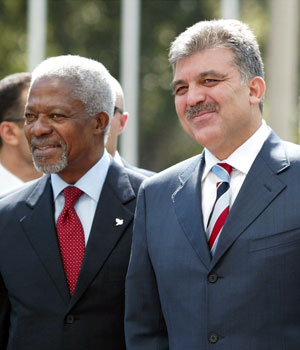
UN Secretary General Kofi Annan (L) and Turkish Foreign Minister Abdullah Gul pose before their meeting in Ankara, 06 September 2006 (AFP)
ANKARA, Turkey (AP)- U.N. Secretary-General Kofi Annan said Wednesday a national consensus in Lebanon was needed to disarm Hezbollah militants, rather than using force, which would “compound the problem.”
Annan, who also met with Prime Minister Recep Tayyip Erdogan, praised Turkey’s decision to join the expanded U.N. peacekeeping force in south Lebanon, saying contributions by various countries were “a sign of international solidarity.”
Annan called on Hezbollah militants in southern Lebanon to lay down their weapons and devote themselves to political activities, adding that Lebanon must take the initiative in disarming Hezbollah.
“There has to be a national consensus among the Lebanese to disarm” Hezbollah, Annan said. “The remaining ones should disarm and devote all their energy to political activities to transform themselves into parties.”
Annan also said use of force “is not the only means” in dealing with Hezbollah.
“Foreigners cannot come and do it. Nor do I believe the Lebanese army can do it forcefully,” Annan said. “I don’t think we need to insist in Lebanon that’s the only way to do it.”
Annan reiterated that U.N. peacekeepers monitoring the cease-fire between Israel and Hezbollah would help Lebanon. But “the mandate is clear: The troops are not there to disarm Hezbollah.”
He repeated his hope that Israel will lift its blockade of Lebanon within days — “the next 36 to 48 hours.”
However, Israel said the blockade would remain as long as it felt threatened.
“Israel will continue to implement the blockade as long as we feel the threat of arms smuggling and rearming Hezbollah. Israel has no interest in a general blockade on Lebanon. Rather our interest is in our self-defense against the rearming of Hezbollah,” said government spokeswoman Miri Eisin.
Israeli officials have confirmed they are in contact with the United Nations over the blockade issue, but say Israel will not lift it until international forces move into Lebanon. It is not clear how many international forces Israel wants before it is ready to leave.
Annan said a mediator he appointed for indirect talks between Israel and Hezbollah on the release of two abducted Israeli soldiers will be “in the region before the end of the week.”
Annan has not said whether a prisoner swap was on the agenda for the mediation effort, and Israel on Monday repeated its stance demanding an unconditional release of the soldiers whose seizure by Hezbollah began the 34-day war.
Annan also said Israel’s withdrawal from southern Lebanon is crucial to the deployment of the 15,000 peacekeepers the U.N. wants to send to monitor the cease-fire alongside Lebanese troops.
“We will have a credible force,” Annan said. But “the withdrawal of Israeli forces is equally crucial.”
Turkey’s ruling party lawmakers voted Tuesday in favor of the deployment of peacekeeping troops, despite objections from opposition parties and street protests by thousands of people. On Wednesday, police used tear gas and water cannons to break up a new demonstration in Ankara by some 300 leftist protesters.
Turkey is the first Muslim nation with diplomatic ties with Israel to pledge troops for the force.
“The 7,000 troops that were offered in Brussels does not include the battalion that is going to come from Turkey. Now that Turkey has contributed, we’ll probably go to 8,000 or so from this region,” Annan said.
Turkish leaders have not specified how many troops would be sent to Lebanon but Foreign Minister Abdullah Gul said the number is unlikely to exceed 1,000.

Syrian parliament deputies meet in Damascus to show solidarity with their protesting counterparts in Lebanon, 05 September 2006 (AFP)

A protester holds a poster that reads “Don’t let Turkey become Israel” during a protest against Turkey’s decision to send troops to Lebanon, 5 September 2006 (REUTERS)
